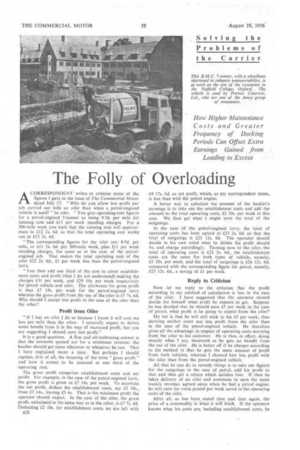The Folly, of Overloading
Page 62

If you've noticed an error in this article please click here to report it so we can fix it.
ACORRESPONDENT writes to criticize some of the figures I gave in the issue of The Commercial Motor dated July 27. "Why do you allow less profit per job carried out with an oiler than when a petrol-engined vehicle is used?" he asks. "You give operating-cost figures for a petrol-engined 5-tonner as being 9.7d. per mile for running cost and -£11 per week standing charges. For a 300-mile week you state that the running cost will approximate to £12 2s. 6d. so that the total operating cost works out at £23 2s. 6d:
"The corresponding figures for the oiler are: 8.9d. per mile, or £11 2s. 6d. per 300-mile week, plus £11 per week standing charges, the same as in the case of the petrolengined job. That makes the total operating cost of the oiler £22 2s. 6d., £1 per week less than the petrol-engined lorry.
"You then add one third of the cost to cover establishment costs and profit (that I do not understand) making the charges £31 per week, and £29 10s. per week respectively for petrol vehicle and oiler, The allowance for gross profit is thus £7 14s. per. week for the petrol-engined lorry whereas the gross profit from the use of the oiler is £7 7s. 6d. Why should I accept less profit in the case of the oiler than the other?
Profit from Oiler
"If I buy an oiler I do so because I know it will cost me less per mile than the other. I naturally expect to derive some benefit from it in the way of increased profit, but you are suggesting I should earn less profit."
It is a good question. A first and all-embracing answer is that the amounts quoted are for a minimum revenue: the haulier should get more wherever or whenever he can. That I have explained many a time But. perhaps I should explain, first of all, the meaning of the term "gross profit" and how it comes to be assessed at one third of the operating cost.
The gross profit comprises establishment costs and net profit. For example, in the case of the petrol-engined lorry, the gross profit is given as £7 14s, per week. To ascertain the net profit, deduct the establishment costs, say £2 10s., from £7 14s., leaving £5 4s. That is the minimum profit the operator should expect. In the case of the oiler, the gross profit, calculated in the same way as in the other, is £7 7s. 6d. Deducting £2 10s. for establishment costs, we are left with 1328 £4 17s. 6d. as net profit, which, as my correspondent states, is less than with the petrol engine.
A better way to calculate the amount of the haulier's earnings is to take out the establishment costs and add the amount to the total operating costs, £2 10s. per week in this case. We then get what I might term the total of the outgoings. '
In the case of the petrol-engined lorry, the total of operating costs has been agreed at £23 2s. 6d. so that the total of outgoings is £25 12s. 6d. The operator should decide in his own mind what he thinks the profit should be, and charge accordingly. Turning now to the oiler, the total of operating costs is £22 2s. 6d., the establishment costs are the same for both types of vehicle, namely, £2 10s. per week. and the total of outgoings is £24 12s. 6d. compared with the corresponding figure for petrol, namely, £25 12s. 6d., a saving of £1 per week.
Reply to Criticism
Now let me reply to the criticism that the profit according to my method of calculation is less in the case of the oiler. I have suggested that the operator should decide for himself what profit he expects to get. Suppose .he has decided that he should earn £5 per week in the case of petrol, what profit is he going to expect from the oiler?
My bet is that he will still stick to his £5 per week, thus deriving neither more nor less profit from the oiler than in the case of the petrol-engined vehicle. He therefore gives all the advantage in respect of operating costs accruing from the oiler to his customer. He is thus, in effect, doing exactly what I say, inasmuch as he gets no benefit from the use of the oiler. He is better off if he charges according to his method in that he gets the same amount of profit from both vehicles, whereas I showed him less profit with the oiler than from the petrol-engined vehicle.
All that he can do to remedy things is to take out figures for the outgoings in the case of petrol, add his profit to that and thus get a return which satisfies him. If then he takes delivery of an oiler and continues to earn the same weekly revenue, agreed upon when he had a petrol engine, he will earn the extra pound per week saved in the operating costs of the oiler.
After all, as has been stated time and time again, the price of a commodity is what it will fetch. If the operator knows what his costs are, including establishment costs, he




































































































